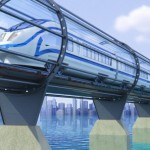 Elon Musk is well known for his sense of flair. The owner of SpaceX and Telsa outdid himself last month however with plans for his Hyperloop project. The project would see trains transported in an airless tunnel at significantly faster speeds than existing high-speed trains. What’s more, the new system would be cheaper.
Elon Musk is well known for his sense of flair. The owner of SpaceX and Telsa outdid himself last month however with plans for his Hyperloop project. The project would see trains transported in an airless tunnel at significantly faster speeds than existing high-speed trains. What’s more, the new system would be cheaper.
Is the project realistic, or mere science fiction? There are valid concerns about the project, and with Musk announcing that he wouldn’t be working on Hyperloop himself you wonder about his own faith in the project.
Equally surprising however was the method chosen to finance it all. Crowdfunding site JumpStartFund has come onto the scene and pledged to finance the endeavour. They’ve based themselves at Hyperloop HQ, and will allow interested outsiders not only to finance the project, but also to input into its design and construction.
Given that Musk believes Hyperloop will cost around $7.5 billion to build, this is far and away the biggest project that crowdfunding has ever attempted to finance. To put that into perspective, it would require every individual in the United States to contribute $25.
JumpStartFund is slightly different to the likes of Kickstarter in that the projects listed on the site require not just funding, but help in refining the core ideas themselves. Entrepreneurs collaborate with the company’s own team of experts to pull together a group of people that can help bring an idea to fruition.
“There are conversations happening all over the place about the Hyperloop,” Dirk Ahlborn, CEO and co-founder of JumpStartFund, said in an interview. “We believe it’s a great idea, and we want to move it forward.”
Can such a vast project be accomplished in this way? I have my doubts, with crowdsourcing projects of a similar size traditionally taking the competition model used by the X Prize and their ilk. These allow smaller teams to each try and solve the challenge, with survival of the fittest weeding out the strong from the weak.
Whilst Linux and the open source movement has delivered exceptional products via a collaborative approach, most open source projects operate under the radar, and so failure is not such a big deal. Hyperloop is very much in the public glare, and as such I think the approach is a pretty big gamble, not least due to the significant political hurdles that stand in the way of the project. It will certainly be an interesting process to follow though.
I would not touch this with a bargepole. I mean how on earth would they offer people a return on their investment?
Is there even any proof that this works? I mean a prototype or something on a small scale? I would think that's the least you'd want to see before putting any cash behind it.
Exactly, and I hope people demand proof this will work before blindly funding this project.
Looks like a descent way to fool people out of a few thousand dollars fairly easily. People need to understand, and get over it though, there is now way a project like this could ever be economically feasible in California of all places, much less more fiscally sound locales.
I would not touch this with a bargepole.:)